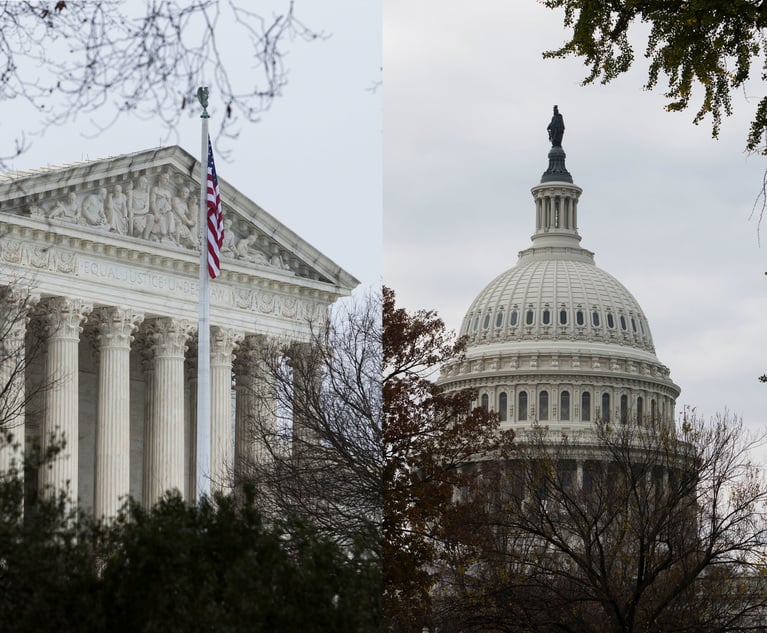Court Declines to Extend Absolute Immunity in Claims Against Stock Exchanges
In their Second Circuit Review, Martin Flumenbaum and Brad S. Karp discuss 'City of Providence, Rhode Island v. BATS Global Markets', in which the court made clear that the absolute immunity stock exchanges enjoy does not extend to activities such as selling products like proprietary data feeds and co-location services to their members.
February 27, 2018 at 02:45 PM
7 minute read

Stock exchanges are indispensable to the modern market economy. Holding powers derived from federal law, the exchanges regulate most aspects of the trading that occurs within their systems. They are expected to do so impartially—and, when acting in their regulatory capacity, are absolutely immune from suit. Yet, stock exchanges are also for-profit entities acting for their own economic benefit. While acting in this role, their actions are not immune from challenge. Naturally, a key question is how far the regulatory function of the exchanges extends.
In City of Providence, Rhode Island v. BATS Global Markets, 878 F.3d 36 (2d Cir. 2017), the Second Circuit made clear that the absolute immunity stock exchanges enjoy does not extend to activities such as selling products like proprietary data feeds and co-location services to their members. In such situations, the exchanges play the role of self-interested entities whose actions can be questioned in court. In City of Providence, the court halted its long-standing trend of reading the absolute immunity of stock exchanges expansively while defining the outer bounds of this immunity for future litigants.
|Background
As self-regulatory organizations (SROs) charged by Congress and the SEC with the responsibility of monitoring the activities of their members, stock exchanges like the New York Stock Exchange (NYSE) and the NASDAQ play a quasi-governmental role. Courts have agreed that when the exchanges “stand in the shoes” of the SEC, their actions are protected by the same absolute immunity that protects judges and prosecutors acting in their official capacities. The scope of this immunity, however, has been a moving target, with City of Providence marking a departure by the Second Circuit from its approach to this question in a prior line of cases.
|Prior Second Circuit Litigation
The Second Circuit first considered the absolute immunity of stock exchanges in Barbara v. New York Stock Exchange, 99 F.3d 49 (2d Cir. 1996). There, a former NYSE floor clerk brought suit after the exchange disciplined him for misconduct by barring him from the exchange floor. The court, noting that the disciplinary role the NYSE had performed was essential to its quasi-governmental function, held that the NYSE's choice to discipline the plaintiff was absolutely immune from suit. In subsequent cases, the Second Circuit extended the absolute immunity of the exchanges to other scenarios, such as the NASDAQ's decision to announce the cancellation of a trade, DL Capital Group v. NASDAQ Stock Market, 409 F.3d 93 (2d Cir. 2005), and the NYSE's choice not to discipline certain of its members for alleged misconduct, In re NYSE Specialists Securities Litigation, 503 F.3d 89 (2d Cir. 2007).
Most recently, the Second Circuit in Standard Investment Chartered. v. National Ass'n of Securities Dealers, 637 F.3d 112 (2d Cir. 2011), held that absolute immunity barred a claim based on alleged misstatements in a proxy solicitation the National Association of Securities Dealers (NASD) issued in advance of a vote to change its bylaws. The change in bylaws was necessary to allow NASD to merge with the NYSE's regulatory arm, the result of which would be the creation of the Financial Industry Regulatory Authority (FINRA). The court recognized that the NASD's choice to consolidate with another SRO was an exercise of its regulatory function, but that the challenged proxy solicitation itself was not. Even so, the court extended absolute immunity to the proxy solicitation because it was “incident” to the NASD's regulatory function as a necessary step for the NASD to amend its bylaws and merge with another SRO. After Standard Investment Chartered, the question was what stock exchange actions would the court find do not fall within the umbrella of absolute immunity, either as regulatory action or as action incident to it.
|'City of Providence'
In City of Providence, the Second Circuit recognized, for the first time, a set of actions by stock exchanges that are not protected from suit by absolute immunity. The claims in the case challenged three activities in which the defendant exchanges engaged: selling proprietary data feeds that give members increased information about trades, selling co-location services through which members can place their computer servers closer to the exchanges' servers, and allowing members to use complex order types that increase the set of maneuvers they can use to compete with other traders on the exchanges. Plaintiffs, all institutional investors, argued that the exchanges prejudiced their ability to fairly compete by selling these services to high-frequency traders (HFTs). Though any exchange member could purchase the services, the plaintiffs contended that the defendant exchanges committed securities fraud via manipulative conduct designed to favor HFTs, both because the services were cost prohibitive to other investors and because the defendant exchanges failed to reveal the significance of the advantages the services afforded the HFT firms that invested in them. At the trial court, the district judge dismissed the plaintiffs' claims, holding in the process that the bulk of the challenged actions was protected from suit by absolute immunity.
On appeal, Judge John Walker Jr., joined by Judge José Cabranes and Judge Raymond Lohier Hr, declined to extend absolute immunity to any of the challenged actions by the defendant exchanges. The panel considered but found unpersuasive the defendants' argument that the court had in previous cases already read the exchanges' absolute immunity to apply not only to the direct regulation of members but also to choices about how to operate the markets, such as the NASDAQ's decision to announce the cancellation of a trade in DL Capital Group. Even in those cases, the panel noted, the challenged actions—such as informing the public of a decision to cancel a trade—were important aspects of the exchanges' regulatory function.
Conversely, the panel saw no regulatory function at play whatsoever in the defendants' decisions to offer proprietary data feeds, co-location services, and complex order types. By selling these products, the panel found, the defendants acted in a fashion “wholly divorced from [their] role as regulators.” Id. at 48. “When an exchange engages in conduct to operate its own market that is distinct from its oversight role,” the panel noted, “it is acting as a regulated entity—not a regulator.” Id. Because the court saw the actions at issue as simply those of exchanges acting in their capacity as for-profit entities, it reversed the trial court's absolute immunity holding and, after finding that the plaintiffs had sufficiently stated their claims, revived the plaintiffs' case against the exchanges.
|Conclusion
In City of Providence, the Second Circuit clearly marked the boundaries of the absolute immunity stock exchanges enjoy throughout a broad swath of the actions they take. The court's holding represents an important shift in the trend of its decisions in this area of law. It also signals to stock exchanges and potential plaintiffs alike that there may be renewed life for claims alleging that exchanges have operated the markets in a fashion that favors some members over others, at least in situations where the exchanges act in a manner “wholly divorced” from their capacity as regulators.
Martin Flumenbaum and Brad S. Karp are litigation partners at Paul, Weiss, Rifkind, Wharton & Garrison, specializing in complex commercial and white-collar defense litigation. Reeves Jordan, a litigation associate at the firm, assisted in the preparation of this column.
This content has been archived. It is available through our partners, LexisNexis® and Bloomberg Law.
To view this content, please continue to their sites.
Not a Lexis Subscriber?
Subscribe Now
Not a Bloomberg Law Subscriber?
Subscribe Now
NOT FOR REPRINT
© 2025 ALM Global, LLC, All Rights Reserved. Request academic re-use from www.copyright.com. All other uses, submit a request to [email protected]. For more information visit Asset & Logo Licensing.
You Might Like
View All
Lessons Learned From the Pager Attack: the Law of War, Warfighting, and the Weaponization of the Supply Chain
8 minute read
Roberts Calls Court's Relationship With Congress 'Strained.' Who's to Blame?


Preemptive Litigation: A Potential Approach for a Precise Situation
13 minute readTrending Stories
Who Got The Work
Michael G. Bongiorno, Andrew Scott Dulberg and Elizabeth E. Driscoll from Wilmer Cutler Pickering Hale and Dorr have stepped in to represent Symbotic Inc., an A.I.-enabled technology platform that focuses on increasing supply chain efficiency, and other defendants in a pending shareholder derivative lawsuit. The case, filed Oct. 2 in Massachusetts District Court by the Brown Law Firm on behalf of Stephen Austen, accuses certain officers and directors of misleading investors in regard to Symbotic's potential for margin growth by failing to disclose that the company was not equipped to timely deploy its systems or manage expenses through project delays. The case, assigned to U.S. District Judge Nathaniel M. Gorton, is 1:24-cv-12522, Austen v. Cohen et al.
Who Got The Work
Edmund Polubinski and Marie Killmond of Davis Polk & Wardwell have entered appearances for data platform software development company MongoDB and other defendants in a pending shareholder derivative lawsuit. The action, filed Oct. 7 in New York Southern District Court by the Brown Law Firm, accuses the company's directors and/or officers of falsely expressing confidence in the company’s restructuring of its sales incentive plan and downplaying the severity of decreases in its upfront commitments. The case is 1:24-cv-07594, Roy v. Ittycheria et al.
Who Got The Work
Amy O. Bruchs and Kurt F. Ellison of Michael Best & Friedrich have entered appearances for Epic Systems Corp. in a pending employment discrimination lawsuit. The suit was filed Sept. 7 in Wisconsin Western District Court by Levine Eisberner LLC and Siri & Glimstad on behalf of a project manager who claims that he was wrongfully terminated after applying for a religious exemption to the defendant's COVID-19 vaccine mandate. The case, assigned to U.S. Magistrate Judge Anita Marie Boor, is 3:24-cv-00630, Secker, Nathan v. Epic Systems Corporation.
Who Got The Work
David X. Sullivan, Thomas J. Finn and Gregory A. Hall from McCarter & English have entered appearances for Sunrun Installation Services in a pending civil rights lawsuit. The complaint was filed Sept. 4 in Connecticut District Court by attorney Robert M. Berke on behalf of former employee George Edward Steins, who was arrested and charged with employing an unregistered home improvement salesperson. The complaint alleges that had Sunrun informed the Connecticut Department of Consumer Protection that the plaintiff's employment had ended in 2017 and that he no longer held Sunrun's home improvement contractor license, he would not have been hit with charges, which were dismissed in May 2024. The case, assigned to U.S. District Judge Jeffrey A. Meyer, is 3:24-cv-01423, Steins v. Sunrun, Inc. et al.
Who Got The Work
Greenberg Traurig shareholder Joshua L. Raskin has entered an appearance for boohoo.com UK Ltd. in a pending patent infringement lawsuit. The suit, filed Sept. 3 in Texas Eastern District Court by Rozier Hardt McDonough on behalf of Alto Dynamics, asserts five patents related to an online shopping platform. The case, assigned to U.S. District Judge Rodney Gilstrap, is 2:24-cv-00719, Alto Dynamics, LLC v. boohoo.com UK Limited.
Featured Firms
Law Offices of Gary Martin Hays & Associates, P.C.
(470) 294-1674
Law Offices of Mark E. Salomone
(857) 444-6468
Smith & Hassler
(713) 739-1250






